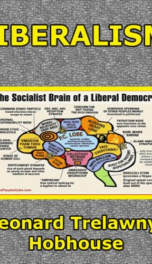Hobhouse Leonard Trelawny

Leonard Trelawny Hobhouse (September 8, 1864 - June 21, 1929) was a British liberal politician, one of the theorists of social liberalism. He worked as an academic and a journalist: he was the first professor of sociology appointed in a British university. He was born in St Ive, near Liskeard in Cornwall.[1] His sister Emily Hobhouse was a noted welfare campaigner. Hobhouse was important in underpinning the turn-of-the-century 'New Liberal' movement of the Liberal party under leaders like Asquith and Lloyd George. He distinguished between property held 'for use' and property held 'for power'. He also theorized that property was acquired not only by individual effort but by societal organization (meaning, those who had property owed some of their success and thus had some obligation to society), providing theoretical justification for a level of redistribution provided by the new state pensions. It is important to note, however, that Hobhouse disliked Marxist socialism, describing his own position as "liberal socialism". Hobhouse occupies a particularly important place in the intellectual history of the Liberal Democrats because of this. His work also presents a positive vision of liberalism in which the purpose of liberty is to enable individuals to develop, not solely that freedom is good in itself. Hobhouse, by contrast, said that coercion should be avoided not because we have no regard for other peoples' well-being, but because coercion is ineffective at improving their lot. Hobhouse rejected classical liberalism, noting the work of other liberals who had pointed out the various forms of coercion already existing in society apart from government. Therefore, he proposed that to promote liberty the government must control those factors already existing which worked against it. Hobhouse held out hope that Liberals and what would now be called the social democrat tendency in the nascent Labour party could form a grand progressive coalition. Hobhouse was often disappointed that fellow collectivists in Britain at the time also tended to be Imperialists. Hobhouse opposed the Boer war and had reservations about the First World War. He was an Internationalist and disliked the pursuit of British national interests as practised by the governments of the day.
do you like this author?
What readers are saying
What do you think? Write your own comment on this book!
write a commentWhat readers are saying
What do you think? Write your own comment on this author!
write a commentBook list

Liberalism
Series:
Unknown
Year:
Unknown
Raiting:
2.5/5
Most famous work by Leonard Trelawny Hobhouse, a British liberal politician, academic and journalist, one of the theorists of social liberalism. Published in 1911. The author outlines his program for what is now called liberal socialism. This program attempted to harmonize the idea of collective control with that of individual liberty. His books also include The Theory of Knowledge (1896), Morals in Evolution (1906), and Social Development (1924).
Show more
add to favoritesadd In favorites
Book list

Liberalism
Series:
Unknown
Year:
Unknown
Raiting:
2.5/5
Most famous work by Leonard Trelawny Hobhouse, a British liberal politician, academic and journalist, one of the theorists of social liberalism. Published in 1911. The author outlines his program for what is now called liberal socialism. This program attempted to harmonize the idea of collective control with that of individual liberty. His books also include The Theory of Knowledge (1896), Morals in Evolution (1906), and Social Development (1924).
Show more
add to favoritesadd In favorites
What readers are saying
What do you think? Write your own comment on this author!
write a commentGenre
if you like Hobhouse Leonard Trelawny try:
readers also enjoyed
What readers are saying
What do you think? Write your own comment on this author!
write a commentGenre
if you like Hobhouse Leonard Trelawny try:
readers also enjoyed
Do you want to exchange books? It’s EASY!
Get registered and find other users who want to give their favourite books to good hands!

